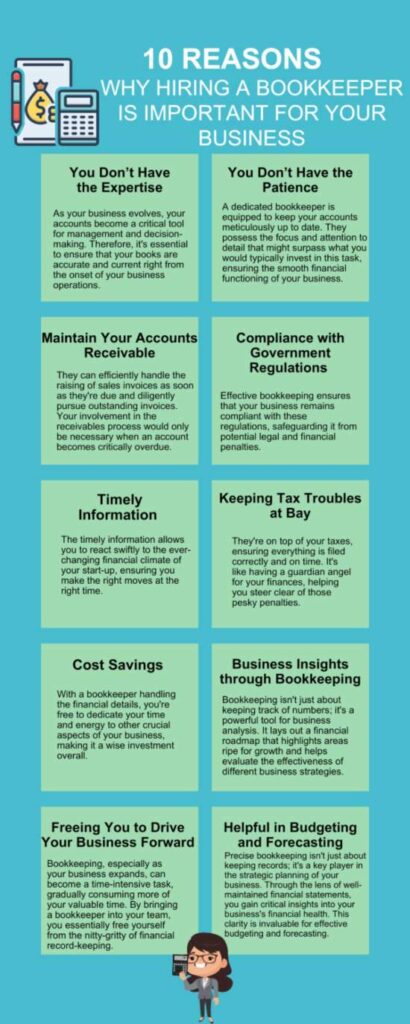
10 Reasons-Why Hiring a Bookkeeper is Important for Your Business

As an entrepreneur, maintaining a firm grip on your finances is not just important, it’s the cornerstone of your business’s success. Amid the whirlwind of daily tasks, the critical role of bookkeeping can often be overlooked, potentially leading to adverse long-term consequences for your business.
Bookkeeping is more than a mere administrative chore; it’s a vital practice that ensures the financial well-being of your enterprise. It involves the meticulous recording, organizing, and analyzing of every financial transaction. Prioritizing bookkeeping is essential, as even minor errors can escalate into significant financial troubles in the future. Embrace the discipline of thorough bookkeeping, and you’ll set the stage for lasting success in your business endeavors.
In this blog post, we’re going to explore the essentials of bookkeeping and provide you with 10 solid reasons why it’s critically important for every business.
Understanding Bookkeeping: The Backbone of Business Financial Management
Bookkeeping is a crucial skill in the business world, encompassing the systematic recording and organization of financial transactions. This task involves meticulously tracking various financial aspects such as income, expenses, sales, purchases, payroll, and other monetary elements pertinent to a business.
More than just maintaining financial records, bookkeeping also involves a thorough verification process, where each transaction is cross-checked for accuracy. This level of detail ensures that financial records are precise and reliable.
The role of bookkeeping is fundamental to the smooth operation and growth of any business. It provides a clear financial picture, enabling businesses to monitor their financial health, analyze performance, and make informed decisions. This financial clarity is essential for any business aiming to maintain control over its finances and steer towards sustainable growth.
Effective bookkeeping is not just about recording transactions; it’s also about managing and understanding your expenses. This is especially crucial for small business owners who need to maintain a tight control over their finances. A key component of this is tracking expenses efficiently. Small business owners can benefit from How to Track Your Small Business Expenses Effectively: 7 Easy Steps, a guide that offers practical steps to streamline your financial tracking. By following these steps, small business owners can gain better insight into their financial health and make more informed decisions

1. You Don’t Have the Expertise
Bookkeeping involves much more than just recording numbers. It requires a professional touch, where a skilled bookkeeper not only knows the appropriate accounting treatments for various transactions but also understands the intricacies of setting up an accounting system tailored to your business needs. As your business evolves, your accounts become a critical tool for management and decision-making. Therefore, it’s essential to ensure that your books are accurate and current right from the onset of your business operations. This level of expertise is crucial for laying a strong financial foundation for your growing business.
2. You Don’t Have the Patience
Bookkeeping can often be a tedious and time-consuming aspect of managing a business, a task that demands a great deal of patience. It’s common for business owners to feel overwhelmed by the prospect of posting numerous vendor invoices or issuing a stack of checks. This lack of patience can lead to taking shortcuts or procrastinating on crucial accounting tasks.
Such delays in updating accounts diminish the value of the management information and could lead to complications with suppliers due to late payments. In contrast, a dedicated bookkeeper is equipped to keep your accounts meticulously up to date. They possess the focus and attention to detail that might surpass what you would typically invest in this task, ensuring the smooth financial functioning of your business.
3. Maintain Your Accounts Receivable
In the bustling early stages of a start-up, it’s easy to overlook the management of your accounts receivable. Failing to promptly follow up on overdue sales invoices can lead to significant cash flow issues. Moreover, postponing the task of issuing sales invoices to the weekend can further strain your cash flow. This is where a bookkeeper becomes invaluable.
They can efficiently handle the raising of sales invoices as soon as they’re due and diligently pursue outstanding invoices. Your involvement in the receivables process would only be necessary when an account becomes critically overdue, freeing you to focus on other crucial aspects of running your business.
4. Compliance with Government Regulations
Adherence to government regulations is a critical aspect of running a business, and bookkeeping plays a key role in this. Regulations set forth by entities like the Securities and Exchange Commission (SEC) and the Financial Industry Regulatory Authority (FINRA) require meticulous financial record-keeping.
Neglecting these requirements can lead to severe consequences, including substantial fines, legal challenges, and possibly the revocation of business licenses. Effective bookkeeping ensures that your business remains compliant with these regulations, safeguarding it from potential legal and financial penalties.
5. Timely Information
In the start-up world, your business’s financial health can change as quickly as the weather. Keeping a sharp eye on costs, sales, and gross margins is absolutely essential. But, discovering you’re off target six months later? That’s as helpful as a delayed weather report during a storm.
This is where a bookkeeper becomes invaluable. They’re not just keeping records; they’re your financial forecasters, providing you with the latest financial data and management accounts just when you need them. This timely information allows you to react swiftly to the ever-changing financial climate of your start-up, ensuring you make the right moves at the right time
6. Keeping Tax Troubles at Bay
Let’s face it, when you’re in the thick of running a business, tax deadlines can easily slip your mind. But here’s a bit of a wake-up call: the IRS notes that 40% of small businesses end up with tax penalties. That’s a lot! This is where a bookkeeper becomes your business’s unsung hero.
They’re on top of your taxes, ensuring everything is filed correctly and on time. It’s like having a guardian angel for your finances, helping you steer clear of those pesky penalties. With a bookkeeper in your corner, you’re more likely to stay out of that 40% bracket and keep your business sailing smoothly through tax season.
7. Cost Savings with a Bookkeeper
While it might initially seem like an added expense, hiring a bookkeeper is actually a smart financial move for the long term. Your bookkeeper is more than just a numbers person; they’re a vital asset in managing your cash flow and equipping you with the information needed for better decision-making.
Beyond this, a bookkeeper can save you a significant amount of money by avoiding unnecessary tax penalties and other late payment fees. Plus, consider the value of your own time. With a bookkeeper handling the financial details, you’re free to dedicate your time and energy to other crucial aspects of your business, making it a wise investment overall.
8. Business Insights through Bookkeeping
Bookkeeping isn’t just about keeping track of numbers; it’s a powerful tool for business analysis. It lays out a financial roadmap that highlights areas ripe for growth and helps evaluate the effectiveness of different business strategies.
As a business owner, you can use bookkeeping to dissect your financial performance, spotting trends in income, expenses, and profit margins that might otherwise go unnoticed. It’s like having a financial microscope, giving you a closer look at the health of your business.
For example, through diligent bookkeeping, you might discover that some suppliers are costing you more than others. With this insight, you can negotiate better deals, trimming down expenses, and boosting your bottom line. In essence, bookkeeping isn’t just about maintaining records; it’s about uncovering opportunities to enhance your business’s profitability.
9. Freeing You to Drive Your Business Forward
The decision to hire a bookkeeper goes beyond just managing finances; it’s about prioritizing your role as a business leader. Bookkeeping, especially as your business expands, can become a time-intensive task, gradually consuming more of your valuable time. By bringing a bookkeeper into your team, you essentially free yourself from the nitty-gritty of financial record-keeping.
This shift allows you to concentrate fully on the bigger picture – steering your business towards success. It’s about investing in your business’s future by investing in your own time, channeling your energies into growth, strategy, and the core activities that define your business’s success story.
10. Helpful in Budgeting and Forecasting
Precise bookkeeping isn’t just about keeping records; it’s a key player in the strategic planning of your business. Through the lens of well-maintained financial statements, you gain critical insights into your business’s financial health. This clarity is invaluable for effective budgeting and forecasting.
These financial statements are more than mere numbers; they’re a window into your business’s future, helping you pinpoint areas where you can cut costs or where investing more resources could propel you towards your long-term financial goals.
For example, by analyzing these statements, you can anticipate cash flow trends, preparing you for upcoming expenses and helping you navigate the financial aspects of your business with greater foresight and precision. In essence, bookkeeping equips you with the tools to manage your resources more effectively and make informed decisions about your business’s financial trajectory.
In addition to understanding the basic importance of bookkeeping, it’s also crucial for business owners to consider how they can further optimize their financial management strategies. One significant trend that is reshaping the landscape of financial management is accounting outsourcing.
This approach is not just a logistical decision; it represents a strategic shift that can have profound implications for your business’s efficiency and growth. Learn why Accounting Outsourcing is a Game Changer for Businesses, and discover how this transformative approach can streamline your financial operations, provide access to top-tier accounting expertise, and ultimately drive better financial decision-making. Embracing this trend can be a pivotal step in elevating your company’s financial management to the next level
Bookkeeping Options: In-House vs. Outsourcing
In the journey of managing your business’s finances, a pivotal decision you’ll encounter is choosing between in-house bookkeeping and outsourcing. While managing bookkeeping within your company offers direct control and immediate access, it’s not without its challenges, including the need for additional resources and expertise.
On the other hand, outsourcing bookkeeping can be a game-changer, especially for businesses aiming to streamline their operations. Outsourcing offers several advantages:
- Access to Specialized Expertise: Outsourced bookkeepers often bring a wealth of experience and are well-versed in the latest accounting practices and technologies.
- Cost-Effectiveness: It can be more cost-efficient than hiring a full-time employee, especially when considering the associated costs like benefits, training, and office space.
- Focus on Core Business Functions: By outsourcing bookkeeping, you free up valuable time and resources that can be better spent on growing your business and focusing on core competencies.
- Scalability: Outsourced services can easily be scaled to match your business’s growth, providing flexibility that is hard to achieve with an in-house team.
- Enhanced Financial Operations: With professional bookkeepers handling your finances, you can expect improved efficiency, accuracy, and compliance.
To delve deeper into how this option can benefit your specific business context, Discover The Benefits of Outsourcing Bookkeeping. This resource will help you understand how delegating bookkeeping tasks can not only enhance your business’s financial operations but also contribute to overall strategic growth and efficiency.
5 Essential Tips for Hiring the Right Bookkeeper
- Look for Relevant Experience and Expertise:
When hiring a bookkeeper, prioritize candidates with experience in your specific industry. Different sectors have unique financial practices and regulations. A bookkeeper who is familiar with your industry’s nuances will be more effective in managing your financial records.
- Check for Qualifications and Certifications:
Ensure the bookkeeper has the necessary qualifications, such as a degree in accounting or a related field. Certifications, like those from the American Institute of Professional Bookkeepers (AIPB) or the National Association of Certified Public Bookkeepers (NACPB), indicate a higher level of professionalism and expertise.
- Assess Compatibility with Your Accounting Software:
If your business already uses specific accounting software, it’s beneficial to hire a bookkeeper who is proficient with that platform. This will facilitate a smoother integration into your existing financial processes.
- Evaluate Communication Skills:
A good bookkeeper should not only be skilled in numbers but also in communication. They should be able to explain financial information clearly and be proactive in addressing potential issues. Effective communication is key to ensuring that you are always informed about your business’s financial status.
- Ask for References and Conduct a Background Check:
Before making a hiring decision, ask for references from previous employers and conduct a thorough background check. This will give you insight into the bookkeeper’s reliability, work ethic, and track record, helping to ensure that you entrust your finances to a trustworthy professional.
Final Thoughts
In conclusion, bringing a bookkeeper into your business team is more than just a convenience; it’s a strategic decision with long-term benefits. A bookkeeper not only saves you invaluable time but also has the potential to save you money down the line. They are your go-to source for the financial information that’s critical for managing and scaling your business.
While the principles of bookkeeping hold true across various industries, certain business types, like law firms, have unique financial management needs. For new law firms, understanding the basics of financial management is crucial. Demystifying Legal Bookkeeping: Beginner’s Guide for New Law Firms offers invaluable insights for those just starting out, providing tailored advice to navigate the complexities of legal financial management. This guide is an essential resource for new law firms looking to establish solid financial practices from the outset.
Financial Pitfalls? Not On Our Watch – Partner with Papillon House
The road to business success is riddled with financial landmines. With Papillon House, sidestep them with ease. We’re not just bookkeepers; we’re your financial strategists, deftly handling tax planning and payroll, transforming fiscal fears into triumphs. Your business deserves a bookkeeping partner who turns financial uncertainty into strategic mastery.
Ready to outsmart financial pitfalls? Team up with Papillon House.

People also ask
Why is hiring a bookkeeper important for my business?
Hiring a bookkeeper is crucial because they ensure accurate financial records, aid in compliance with laws and regulations, and provide valuable insights for informed decision-making.
Can a bookkeeper help with tax preparation?
Yes, bookkeepers play a vital role in tax preparation by maintaining organized financial records, which simplifies and streamlines the tax filing process.
How does a bookkeeper contribute to business growth?
Bookkeepers contribute to business growth by managing financial data effectively, allowing you to focus on core business activities and strategic planning.
Will hiring a bookkeeper save me money?
Yes, a bookkeeper can save you money by preventing costly errors, identifying financial inefficiencies, and providing insights for better financial management.
Is a bookkeeper necessary for small businesses?
Absolutely, even small businesses benefit significantly from a bookkeeper’s expertise in managing finances accurately and efficiently, which is critical for sustainability and growth.
How does bookkeeping impact my relationship with investors or lenders?
Accurate bookkeeping is key for maintaining trust with investors and lenders. It provides them with clear insights into your business’s financial health, influencing their confidence in your venture.
Can a bookkeeper help in financial forecasting?
Yes, bookkeepers play a crucial role in financial forecasting by providing precise data that forms the basis for realistic and effective financial projections and strategies.
What is the risk of not having a professional bookkeeper?
Without a professional bookkeeper, businesses risk financial mismanagement, non-compliance with tax laws, and missed opportunities for cost savings and growth, leading to potential financial crises.
About Morgan

Morgan is the Director at Papillon House Bookkeeping, a Tampa, Florida-based firm that specializes in bookkeeping services for law offices, architects, and the construction industry. With over three years of experience in her current role, she aids her clients in meticulously organizing their financials. Morgan's dedication and expertise extend beyond the realm of accounting, allowing her to provide comprehensive financial management solutions. She also engages with her audience through live discussions on the Papillon House Bookkeeping Facebook group page.




